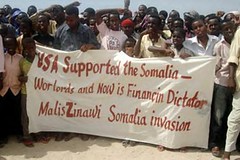 Photo: A UN tank looms behind an obviously dangerous Haitian woman, Thony Belizaire/AFP © Getty
Photo: A UN tank looms behind an obviously dangerous Haitian woman, Thony Belizaire/AFP © GettySince becoming the world's first independent black republic in 1804, born from history's only successful national slave rebellion, Haiti has suffered more than two centuries of abuse at the hands of Western powers. From France's initial crippling of the Haitian economy, to decades of U.S. military occupation, and subsequent support for the brutal Duvalier dictatorships, Haiti has long been a focal point for Western imperialism. Given this past, and the country's status as "the victim of [the] most US intervention[s] in the 20th century by a long shot," it is unsurprising that Haiti is the Western hemisphere's poorest nation.
It is a long-running storyline that continues largely unabated to the present.
In 1990, the Haitian poor majority experienced a brief period of actual hope, having voted into office Jean-Bertrand Aristide, a Catholic priest and proponent of liberation theology who had become well-known for his devotion to the Haitian masses. Turning to the present, some 17 years later, Aristide finds himself in forced exile in South Africa, the country's social ills continue unaddressed, and an unpopular UN force continues its military occupation of the country.
The question of how the Haitian people have gone in these past 17 years from joy to despair (and there and back again, several times over) is an instructive one, revealing at every turn Washington's continued insistence on crushing moves towards meaningful independence for the country.
From the moment of Aristide's 1990 election - Haiti's first ever popularly elected president - the U.S. "did what it could to undermine him and to funnel support to the Haitian military," an institution almost universally reviled in Haiti for its brutality and servile role to U.S. interests. In 1991, the military overthrew Aristide, triggering public denunciations from Washington that were difficult to take seriously given longstanding U.S. ties to the coup plotters. However, as the governing military regime plunged Haiti further into chaos, threatening the investment climate and swelling the number of Haitian refugees fleeing to the U.S. to escape the carnage, Washington threatened to invade the country in 1994 in order to reinstall Aristide.
Despite misgivings about U.S. motives, most Haitians were glad to see the U.S. take action, and heaped praise on the U.S. soldiers who oversaw the transition back to civilian government. As noted in The Progressive, the majority of Haitians wanted the U.S. "to come in and obliterate the Haitian army."
Whatever the initial feelings of euphoria, it was also clear that the U.S. exacted a heavy price from Aristide in return for his being permitted to reassume the Haitian presidency. As reported in the same piece, Washington pressured the Aristide government to:
...put its name to a "structural adjustment plan" of the sort usually advanced by the World Bank and the International Monetary Fund—namely, the cutting of government bureaucracies and public programs, the privatisation of publicly-owned utilities, the promotion of exports, and an "open-investment policy" that would slash tariffs and eliminate any import restrictions that might trammel investors, especially those of the foreign variety. Haitian-American scholar Patrick Bellegarde-Smith, speaking of the Paris agreements, complained that "the Haitian delegation to the World Bank signed away the economic independence of the country."After serving out his presidency, and sitting out for a term as required by the Haitian constitution, Aristide was nevertheless again elected in 2000, buoyed by the new Lavalas political party, which he had founded to combat privatization and the role of international financial institutions.
In confronting the same powerful groups and nations as before, Aristide was again overthrown in 2004. In what he describes as his "modern kidnapping" by the U.S. military, Aristide was taken - without his consent or knowledge - to the Central African Republic; he remains in exile in South Africa, still unable to serve the remainder of his second term as president.
Shortly after Aristide's overthrow, a UN force (MINUSTAH) deployed in Haiti, initiating an indefinite occupation. Though a supposed example of "humanitarian intervention" aiming to bring stability to Haiti, MINUSTAH has demonstrated a servile attention to the U.S. (as well as Canadian and French) agenda by supporting the political and economic status quo in Haiti and failing to call for the return of the president-in-exile.
MINUSTAH's supposed role in halting violence in Haiti is also far from laudatory, indeed it often does quite the opposite, perpetuating carnage instead. According to a Harvard law report, "MINUSTAH has been the midwife" of the Haitian police in their serious human rights abuses, providing them with "the very implements of repression."
It is quite clear that the UN mission in Haiti is intended to pacify a restive population; indeed, the UN “peacekeeping” force’s behavior is hard to distinguish from that of an occupying army. On two separate occasions, July 6, 2005 and December 22, 2006, the UN troops entered the Port-au-Prince slum of Cité-Soleil in force and killed scores of bystanders. MINUSTAH appears to have intentionally targeted civilians with lethal shots to the head.
There is some evidence to indicate that the UN fired into civilian residential areas from helicopters during the July 6, 2005 attack. In the December 22, 2006 attack, UN forces denied the Haitian Red Cross entry to the area they were attacking and refused to permit the Red Cross to treat injured children.
Given the current buzz surrounding a potential "humanitarian intervention" in Darfur, the poor human rights record of the Haitian incarnation, as well as its servility to Western power, should not soon be forgotten.
